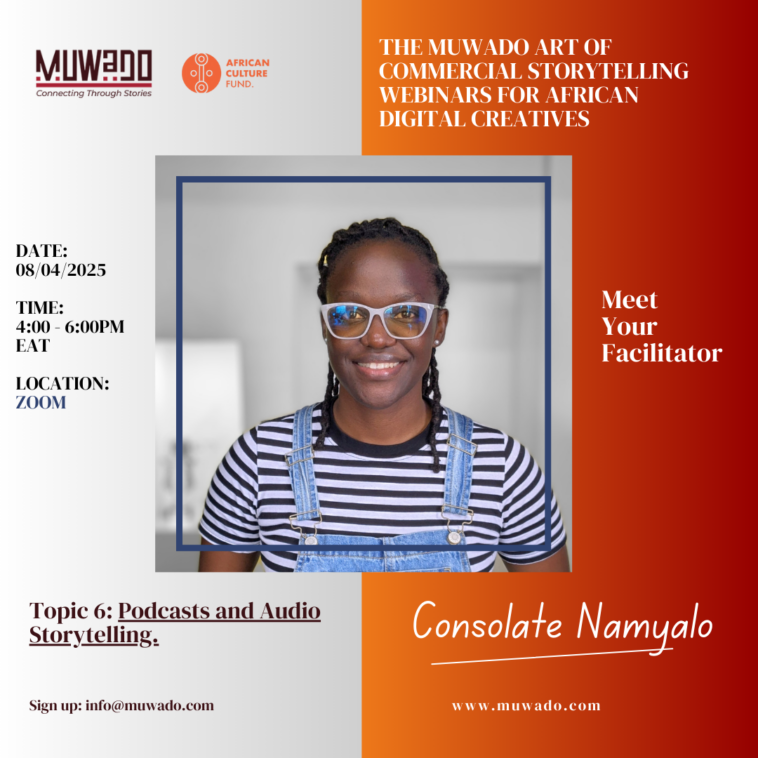• The Muwado Team to share examples of podcasts recorded using phones in the WhatsApp group.
| Summary |
|
| Podcasting and Audio Storytelling Introduction |
| In the meeting, The Muwado Team introduced the session on audio storytelling and podcasting, highlighting the platform’s support for podcast uploads. Consolate, a Ugandan storyteller, was introduced as the facilitator. Consolate shared her experience in media and storytelling, emphasizing her commitment to community building through audio and visual storytelling. The session aimed to provide an introduction to podcasting, audio storytelling formats, and tools for ongoing efforts. Consolate also briefly discussed African oral traditions and their potential use in storytelling. |
| Podcast Creation and Monetization Strategies |
| In the meeting, Consolate explained the concept of a podcast, describing it as a digital audio program that can be downloaded or streamed. She discussed various types of podcasts, including monologues, interviews, conversations among hosts, narration/voiceover, non-narrated, and performance presentations. Consolate provided examples of popular podcasts and their formats, emphasizing the importance of authenticity and interaction in podcast creation. She also touched on the potential for monetization through syndication and book promotion. |
|
|
| Planning and Preparation for Podcast Success |
| Consolate discussed the importance of planning and preparation before starting a podcast. She emphasized the need for a clear purpose, a well-defined concept, and a structured flow for each episode. Consolate also highlighted the importance of considering the timing and duration of episodes, preparing questions for guests, and leaving room for natural interactions. She suggested that the choice of host could also impact the success of a podcast, recommending that the host should be someone who can effectively carry the message of the podcast. |
| Choosing a Niche for Podcast Success |
| In the meeting, Consolate discussed the importance of having a niche for a podcast, emphasizing that it’s crucial to choose a topic that one can relate to easily and speak about confidently. She also highlighted the significance of having a target audience in mind when creating content. Arnold asked about the feasibility of having a general conversation versus a niche topic, and Consolate advised focusing on a specific subject to create a strong brand. Sarah inquired about high-performing themes or content types, and Consolate suggested topics that resonate with people’s lives. |
|
|
| Exploring Audio Storytelling Formats |
Consolate discussed various audio storytelling formats beyond podcasting. She explained the importance of voiceovers in adding emotion, context, and depth to narratives, citing examples from documentaries, reality TV, and commercials. Other formats mentioned include narrative nonfiction for educational content, audiobooks as an alternative to reading, traditional radio for news and entertainment, and audio dramas inspired by plays. Consolate emphasized that these formats can be enhanced with sound effects and music to elevate the storytelling experience.
| Essential Tools for Audio Storytelling |
Consolate discussed the essential tools for audio storytelling and podcasting. She emphasized the need for a microphone, headphones, and a reliable recording setup. For beginners, she suggests using podcast recording apps like Pod Bean, Riverside.fm, or Spotify for Creators (formerly Anchor) on smartphones. Consolate also recommended portable recorders like the Zoom H4N Pro for those with limited budgets. She advised on audio editing software options and the importance of a quiet recording environment. When asked about equipment sources in Uganda, Consolate suggested Amazon, Camera Hub UG, and trusted local sellers, while also mentioning the option of renting studio space for recording multiple episodes.
|
African Audio Storytelling Traditions |
| Consolate discussed African audio storytelling traditions and their modern adaptations. She explains that oral traditions were the first form of communication in African societies, used to teach morals, preserve culture, and build community. These stories often included proverbs, taboos, and songs to convey lessons. Consolate then highlighted how these traditional stories are being reimagined using new technologies, citing examples such as Netflix’s “African Folk Tales Reimagined” series, Raymond Malinga’s Disney animation “Herder Boy,” and various YouTube channels and documentaries that aim to preserve and retell African folktales. She also mentioned how authors like Jenifer Makumbi incorporate traditional elements into their books to keep these stories alive for new generations. |
|
|
| African Oral Storytelling Reinvention Strategies |
Consolate discussed the reinvention of African oral storytelling and its potential for reinvention. Sarah asked about the effectiveness of incorporating visual elements into podcasts, to which Consolate responded that both audio and visual mediums can be beneficial, but it depends on the resources available. Consolate also suggested that podcasts could be syndicated to traditional radio for wider reach and potential advertising revenue.
| Authenticity in Audio Storytelling |
| Consolate discussed the importance of authenticity and emotional connection in audio storytelling. She explained that voiceover artists should immerse themselves in the character and deliver the script in the intended tone. Consolate also shared her experience working with international brands and how she secured these gigs by creating a profile on various platforms and allowing her voice to be presented to potential clients. She emphasized that audio storytelling requires more work than visual storytelling, as it relies on the listener’s imagination and the narrator’s ability to evoke emotions. |
|
|
| AI in Voice Acting and Content Creation |
Consolate discussed the potential of AI in voice acting and content creation, emphasizing that while AI can produce content, it lacks the human element necessary for genuine emotional connection. She shared an example of an Adidas advertisement created entirely with AI, noting that viewers could tell the models weren’t real people. Consolate also provided advice on building confidence in audio storytelling, suggesting practices like reading aloud and imagining an audience. She emphasized the importance of sharing relatable personal experiences to connect with listeners and offers exercises for developing podcasting skills, including analyzing successful hosts’ techniques.
The next session is on Tuesday, 15th April – LEVERAGING TECHNOLOGY, AI AND MULTIMEDIA FOR BETTER STORYTELLING

Lorna Okeng is a creative technologist, immersive curator, foresight practitioner, and researcher with a deep interest in futures, new frontiers of storytelling, cultural diplomacy, and technology experimentation.
A trained electrical and computer engineer, with over nine (9) years of experience working with internet and emerging technology companies, including Google, Vodafone and Electric South, her work sits at the intersection of art (visual art + design + music), disruptive technologies (Generative AI, Augmented and Virtual Reality), and societies utilizing systems and futures thinking approaches to push the boundaries of creative expression.
Lorna is also a Creative & Digital Economy Research and Policy consultant focused on African and emerging markets, and a lead research contributor to the Africa XR Report. She is a Next Generation Foresight Practitioner Fellow at the School of International Futures, a member of the World Metaverse Council and a Lifeboat Foundation Futurist Advisory Board member.
With this session, the goal is to learn:
- Digital storytelling: blogs, social media, and interactive narratives.
- Using multimedia elements: audio, video, and graphics to enhance storytelling.
Training Community Group On Muwado
To make the most of this training, it is better if you are a member of Muwado. If you are not yet, you can register here: https://muwado.com/register.
Once you have created an account and are logged in, you can start sharing your stories here: https://muwado.com/create.
We have created a community group where we shall be discussing the lessons, posting assignments for feedback from our peers and working to ensure we are all learning together. When you are logged in, join the group here: https://muwado.com/groups/the-muwado-art-of-commercial-storytelling-webinars/
We have also recently created a Whatsapp Group due to popular demand, so send us an email at [email protected] with your contact, and we shall add you.
We’ll be sharing additional features of the platform that you can take advantage of over the course of the training. If you have any questions or challenges, you can reply to this email, and we will help you out. |
|
|
|
|
|
|
|







